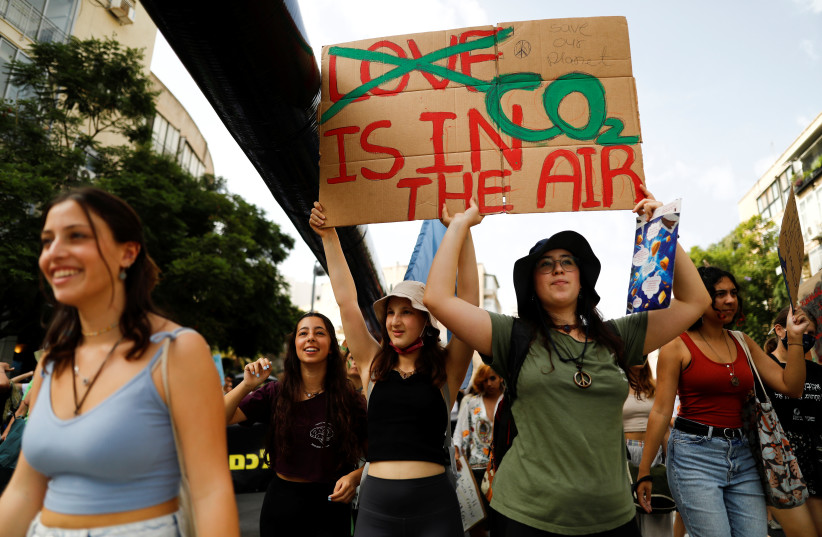A very large delegation from Israel is participating in the UN’s annual climate change summit, COP27, hosted by Egypt, which opened in Sharm e-Sheikh on Sunday. In addition to about 100 officials from various government ministries, some 700 participants including many climate tech companies are set to participate.
Prime Minister Yair Lapid canceled his participation at the last minute following his election loss, but President Isaac Herzog will be leading the delegation, and high-level government members, including Environmental Protection Minister Tamar Zandberg are taking part.
Speaking ahead of the event last week, the president said: “I see an unparalleled opportunity in this delegation to make a firm statement about the magnitude of the challenge, to present our accomplishments and capabilities and of course to extend a hand to our neighbors and partners so that we may fight together for the future of Planet Earth and of our environment.”
“I see an unparalleled opportunity in this delegation to make a firm statement about the magnitude of the challenge, to present our accomplishments and capabilities and of course to extend a hand to our neighbors and partners so that we may fight together for the future of Planet Earth and of our environment.”
Israeli President Isaac Herzog
Zandberg issued a statement saying: “Israel is coming to the COP27 in a better state than it arrived at last year’s Climate Conference in Glasgow. Over the past year, we have taken many policy steps to further the subject of dealing with the climate crisis in Israel, both in preparatory measures and strengthening our climate resilience, and in the field of lowering greenhouse gas emissions.”

Israel needs to make progress on fighting climate change
Although Zandberg noted that progress had been made regarding the Climate Law in Israel, it still has not passed. Similarly, regulation including the climate crisis as a chapter in the Israel National Security Council’s multi-year assessment – reflecting readiness to deal with fires, floods, heat waves and cold snaps and climate refugees, for example – are still in progress, but not ready.
Last year at the Glasgow conference, then-prime minister Naftali Bennett made the commitment that Israel would reach net-zero carbon emissions by 2050, as a partner to the 2015 Paris Agreement. While Israel is far from being the only country unable to meet its stated goals, it makes sense this year for the country to focus on practical innovations and measures in which it is a world leader, as well as how it can help other countries, particularly those less economically advanced.
According to the Environmental Protection Ministry, one in seven start-ups last year were in climate tech, including in the challenging fields of smart agriculture, clean energy systems, sustainable mobility and transportation. Israel is a leading and creative force when it comes to developing meatless meat and milk without cows, desalination and water protection, and many other fields.
This year, while the world is coming out of the COVID pandemic, it is being influenced by the havoc caused as a result of Russia’s invasion of Ukraine. The cost of fuel and energy, for example, and the crisis in supplies of grain are very real and will definitely be on the COP27 agenda. While Israel has been spared the worst effects of the energy crisis, how it manages its growing gas industry is very relevant.
Israel and its Mediterranean neighbors are situated in a climate change “hot spot,” where the rise in temperatures and changes in rainfall patterns will continue to have an impact.
On Thursday, ahead of COP27, the Department of World Religions of the Ministry of Foreign Affairs, in collaboration with the Interfaith Center for Sustainable Development, held a first-of-its-kind interfaith conference on the role of religious leadership in dealing with climate change and signed the Jerusalem Climate Declaration.
While such initiatives are very welcome, the it’s time to move on from declarations and raising awareness to taking real action, passing the necessary legislation, ensuring the budget for implementation and – no less important – enforcing existing and future environmental laws.
As coalition talks take place to create a new government, we hope that the matter of environmental protection does not fall by the wayside.
Threats by members of the incoming coalition to remove taxation imposed on single-use plastic utensils that are used in large quantities by ultra-Orthodox families would be short-sighted and a huge step backwards. This is one sacrifice that modern-day Israel must make to show its commitment to helping the environment and we sincerely hope that the current law stays in place.
Dealing with the environmental challenges and protecting the environment for future generations should not be seen as a matter of Left or Right. The environment belongs to us all, regardless of nationality, faith and politics.
